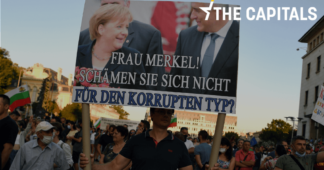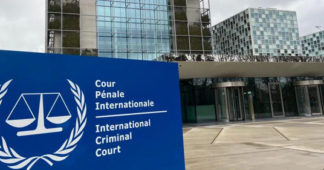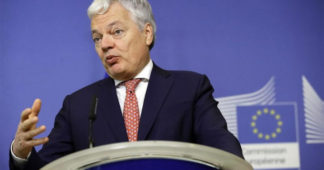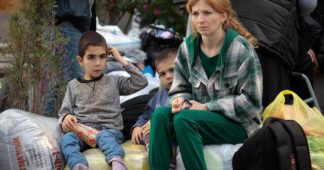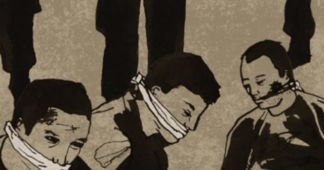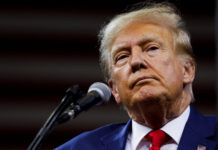To sign this letter, please do so at this link.
For the background to this letter, see the Annex beneath the signatures below.
Dec. 6, 2023
We, the undersigned scholars and practitioners of law, international relations, and politics express our grave concern over the integrity of the Office of the Prosecutor (OTP) of the International Criminal Court (ICC). The conduct of the OTP under Karim Khan’s mandate has prompted urgent concerns about its adherence to impartiality and non-discrimination. During the mandate of former chief prosecutor Fatou Bensouda, the Office has allocated efforts and resources in an attempt to address the fierce criticisms of the OTP’s selective accountability, with a view to correcting the shortcomings that characterized its performance during its early years. Recalling that the criticisms referred-to had contained claims about anti-Global South bias especially in relation to the standards applicable to situation and case selection, we are concerned that the international community is witnessing the erosion of years of dedication to ensure that the ICC is indeed international, impartial, and independent. The possible negative impact that informs our concerns pertains to the future of international criminal justice as a whole, and to the perception that the Court is the last resort for victims of international crimes.
OTP’s Visit to Israel & Palestine: Breach of Impartiality and Non-Discrimination Principles
The Prosecutor’s Duty of Impartiality and Non-Discrimination
According to Article 42 (5) of the Rome Statute “neither the Prosecutor nor a Deputy Prosecutor shall engage in any activity which is likely to interfere with his or her prosecutorial functions or to affect confidence in his or her independence.” Confidence in the independence of the Prosecutor is reliant on upholding impartiality and non-discrimination, among other principles.
In accordance with the ICC Code of Conduct for the Office of the Prosecutor, the OTP and all its members are guided by principles of independence; professional ethics and integrity; fair, impartial, effective and expeditious investigation and prosecution; non-discrimination against individuals or groups of individuals, among others. Impartiality, one of the core principles governing the work of the OTP, includes “refraining from expressing an opinion that could, objectively, adversely affect the required impartiality, whether through communications media, in writing or public addresses, or through any other actions outside the context of the proceedings before the Court”. As such, the OTP should conduct their internal and external dealings impartially, abstain from being directly or indirectly in conflict with the discharge of their official duties, and uphold the highest standards of integrity.
The ICC Prosecutor, as an international civil servant, is contractually required to comply with the relevant standards of conduct, inter alia, the ICSC Standards of Conduct for the International Civil Service. These stipulate the need of international civil servants to “work without bias with persons of all nationalities, religions and cultures; it calls for constant sensitivity as to how words and actions may look to others. It requires avoidance of any expressions that could be interpreted as biased or intolerant.” In reaffirming the principle of non-discrimination, the Standards of Conduct reiterate that “[i]nternational civil servants are expected to respect the dignity, worth and equality of all people without any distinction whatsoever”.
The Prosecutor’s Public Communications visit
During the course of Khan’s mandate thus far, there have been a number of questionable decisions on the Situation in Palestine. These include considerable delays, lack of responsiveness, as well as policies of understaffing and under-resourcing. No more problematic is Khan’s latest meetings, visit and subsequent statement. The Court announced on 30 November 2023 Prosecutor Khan’s visit to Israel at the invitation of victims, after having met with some of them in the Hague previously. In doing that, the Prosecutor has neglected the longstanding pleas from UN special rapporteurs, scholars and international lawyers, NGOs, and Palestinian victims who have ardently requested the Prosecutor’s visit to Palestine and meetings in the Hague for years. The Prosecutor explicitly asserted that the visit, which was carried out without a publicly accessible agenda or transparent funding, is non-investigative, and intended solely to express sympathy and engage in dialogue, acts which fall outside of his mandate as a prosecutor. A lack of transparency also shrouded his subsequent visit to Ramallah. These raise serious concern about the OTP’s commitment to its mandate underlying which are the principles of non- discrimination, and impartiality.
The Prosecutor’s statement further demonstrated selective application of international criminal law, and an extralegal interpretation of its principles. While addressing Israel’s conduct of hostilities, Prosecutor Khan refrained from making any conclusive statements at this stage. In this, he followed the Office’s prosecutorial standards and the language satisfying the evidentiary standards specific to each of the investigation’s stages, and adhered to his announcement that the mission was “not investigative in nature.” However, Khan seems to have already concluded that international crimes have been committed by Palestinian armed groups, thereby undermining the fundamental rules, including on the presumption of innocence and relevant standards.
Prosecutor Khan has used alarming extralegal, political notions, in contravention of the ICSC Standards of Conduct. The Prosecutor has used the term ‘terror organization’ to describe a Palestinian armed group . The terms “terrorism” and “terror organizations” appear nowhere in the Rome Statute or international humanitarian law. Further, in some of the Prosecutor’s communications, Khan uses the adjective ‘innocent’ to describe Israeli civilians. While he does not use the same adjective to refer to Palestinians, this choice of extralegal wording – which was popularized in the U.S. “War on Terror” – insinuates that some civilians deserve more protection than others, and undermines the cardinal principles of international humanitarian law, including the principle of distinction and that civilians cannot be the target of an attack.
In his references to Israeli victims, the Prosecutor has repetitively emphasized the necessity of holding those responsible for the crimes to account. However, when referring to Palestinian victims, he avoids using terms like ‘accountability’ or any equivalent. It appears as if the victims are presented without a corresponding crime or criminal. Notably, he did not make any reference to the risk of genocide in Gaza, which required special procedures under his mandate, despite warnings by the UN and Academic experts. Instead, the Prosecutor has insisted several times on describing Palestinian population and victims in Gaza as civilians “caught in the crossfire”, seemingly concluding that the Israeli military’s conduct of hostilities has respected the principles of “distinction” and “proportionality”. This framing has formed the core of the Israeli official discourse since the 7th of October, but also during the 2014 Gaza War. By adopting it, the Prosecutor seems to have abruptly accepted Israeli officials’ framing, and to have undermined reports on various crimes committed as part of state plans or policies. Further, Prosecutor Khan’s hasty insistence on the “caught in the crossfire” framing stands in opposition to the findings that the Office itself has announced after five years of preliminary examination activities on the 2014 Gaza War, where it found a reasonable basis to believe that members of the Israeli forces have been “intentionally launching disproportionate attacks” and “wilful killing and wilfully causing serious injury to body or health”. Such basis was strongly affirmed in reports by the UN Independant Mission of Inquiry on the 2014 Gaza conflict, among others.
Further, we observe a noticeable acceleration in the work and activity of the Office of the Prosecutor since October 7. While we commend this step, we are concerned that the Prosecutor, in view of his consecutive statements, is acting according to a belief that crimes under the jurisdiction of the Court have taken place only since this date, and is thus “deprioritizing” the crimes that have formed the object of the Office’s activities for almost a decade. We recall the Prosecutor’s controversial “deprioritization” of US personnel conduct in Afghanistan as we observe that Prosecutor Khan has mentioned nowhere in his statements any alleged crimes committed by Israel, including in relation to the West Bank and East Jerusalem. Instead, he consistently maintains that Israel, with its legal experts, “should be able to justify its actions.”
Finally, the Prosecutor’s statement refers to the West Bank and Gaza, while ignoring East Jerusalem. Here it is important to note that in publicizing the Prosecutor’s visit to Israel, the Court posted a photo on X of Prosecutor Khan in occupied and annexed East Jerusalem. Annexation is a grave violation that is supposedly at the center of the Court’s investigations. This lack of foresight in this regard is not acceptable for an office tasked with investigating this context.
In view of this, the prosecutor’s approach to the case of Palestine as exemplified in the extra-legal wording of the statement and the parallel social media publication are in infringement of the prosecutor’s duty to respect the sensitivity of how words and actions may look to others (Para. 14 of the ICSC Standards of Conduct), and poses questions as to whether or not the prosecutor or members of his office were expressing their personal opinion (Para. 9 of the the ICSC Standards of Conduct for the International Civil Service).
Our requests to the ICC’s Assembly of States Parties,
In leading up to the 22nd Assembly of States Parties to the Rome Statute (ASP), human rights and civil society organizations, including Amnesty International, Human Rights Watch and the Anti-Apartheid Movement, have called on States to vehemently oppose double standards, selective justice, and any obstruction of the ICC’s investigation in the Situation in Palestine. Amnesty International warned that the legitimacy of the Rome Statute and the ICC is in jeopardy due to this approach, while emphasizing that the “ICC’s legitimacy and effectiveness depend on the OTP demonstrating – without fear or favour – that it will pursue accountability equally in all situations, including situations where perhaps only its intervention will ensure that certain crimes, perpetrators or situations are investigated.”
Considering the above, it appears that accountability for grave breaches that constitute international crimes committed in Palestine is unforeseeable under the current Prosecutor’s mandate, his actions and policies, as outlined.
Furthermore, we demand the Assembly of State Parties to:
- Provide adequate political and financial support to the Court, ensure that the Prosecutor disburses resources on the basis of investigative needs as opposed to politically-motivated prioritization, and urge it to expedite its investigation into the Situation in Palestine.
- Investigate the adherence of the Prosecutor’s Office to ICSC Standards of Conduct, particularly in relation to impartiality, and non-discrimination.
- Investigate the conduct of the current prosecutor of the international criminal court, Karim Khan, and take appropriate measures in accordance with the mandate of the Assembly derived from Article 112 of the Rome Statute.
Signed:
- Raji Sourani, Human Rights Lawyer, Palestinian Center for Human Rights
- Darryl Li, Associate Professor of Anthropology and Associate Member of the Law School, University of Chicago
- Dr. Lex Takkenberg, Senior Advisor on the Question of Palestine, Arab Renaissance for Democracy and Development
- Dr. Luigi Daniele, Senior Lecturer, Nottingham Law School (NTU)
- Dr. Ata Hindi, Lecturer at Birzeit University
- Susan M. Akram, clinical Professor and Director, International Human Rights Clinic, Boston University School of Law
- Dr Alice Panepinto, Reader in Law, Queen’s University Belfast
- Dr. Shahd Hammouri, Lecturer in Law, The University of Kent
- Maha Abdallah, Graduate Teaching Assistant & PhD Researcher, Faculty of Law, University of Antwerp
- Ihsan Adel, Chair, Law for Palestine
- Mandy Turner, professor of conflict, peace, and humanitarian affairs, University of Manchester, UK
- Nicola Perugini, Associate Professor, University of Edinburgh
- Jessica Whyte, Associate Professor of Philosophy, University of New South Wales
- Laleh Khalili, Al Qasimi Professor of Gulf Studies, University of Exeter
- Mohammad Shahabuddin, Professor of International Law & Human Rights, University of Birmingham
- Rania Madi, Law for Palestine
- Dr.Christopher Gevers, University of KwaZulu-Natal
- Sadhvi Dar, Reader, Queen Mary University of London
- Eric Loefflad, Lecturer in Law, University of Kent
- Dr Marina Velickovic, University of Warwick
- Jo Bluen, London School of Economics
- Khalil Dewan, Head of Legal Investigations at Stoke White Law Firm
- Ryan Glauser, PhD Candidate, University of Michigan
- Gerhard Kemp, Professor of Criminal Law (UWE Bristol); Extraordinary Professor of Public Law (Stellenbosch University)
- Randa Naffa, Director, SADAQA
- Santosh Anand, PhD researcher, City University of London
- Dr Sheetal Soni (School of Law, University of Kwazulu Natal, South Africa)
- Felipe Bley Folly, Research Associate, Law Faculty, University of Tuebingen
- Dr Ruth Sacks, University of Johannesburg
- Nicola Whitear-Nel, University of KwaZulu Natal
- Att. Bassam Abu-Rumman. Founder & managing partner at IQSATLAW
- Suhayfa Bhamjee, University of KwaZulu-Natal
- Miha Marčenko, PhD, Fellow at the European University Institute
- Hala Ahed , lawyer & Human rights advocate
- Prof Salim Vally, University of Johannesburg
- Dylan Asafo, Senior Lecturer, University of Auckland
- Emilio Dabed, Lawyer and activist
- Naoual El Yattouti, PhD student, University of Antwerp
- Jared Sacks, Teaching Fellow, Columbia University
- Rasigan Maharajh, Chief Director, Institute for Economic Research on Innovation
- Saydoon Nisa Sayed, Coordinator of GNRC, South Africa
- Professor Nicola Pratt, University of Warwick
- John Reynolds, Associate Professor, Maynooth University
- Professor Alison MacKenzie, Queen’s University Belfast
- Nisreen Alaraj, regional advisor on sustainable cities and climate change, freelance consultant
- Bana Abu Zuluf. PhD Researcher, Maynooth University
- Dr.Fiammetta Bonfigli, University of Vienna
- Micòl Savia, International Association of Democratic Lawyers (IADL)
- Dr Thomas Phillips, Liverpool John Moores University
- Dr James Allinson, University of Edinburgh
- Dr. Fiammetta Bonfigli, University of Vienna
- Micòl Savia, International Association of Democratic Lawyers (IADL)
- Dr Thomas Phillips, Liverpool John Moores University
- Dr James Allinson, University of Edinburgh
- Fausto Gianelli- ELDH European Association of Lawyers for Democracy and Human Rights in the World
- Dr Lisa Tilley, SOAS, University of London
- Dr Souheir Edelbi, Lecturer in law, Western Sydney University
- Dr. Nadia Kornioti, Associate Lecturer, University of Central Lancashire – Cyprus (UCLan Cyprus)
- Dr Cristina Sáenz Pérez, University of Leeds
- Reeju Ray , Associate Professor, O.P. Jindal Global University
- Dr Nicola Palmer, Reader in Criminal Law, King’s College London
- Rania Muhareb, Irish Research Council and Hardiman PhD Scholar, Irish Centre for Human Rights, School of Law, University of Galway
- Selbi Durdiyeva, Postdoctoral Fellow, Center for Conflict Studies, Philipps University Marburg
- Rawan Arraf, Executive Director, Australian Centre for International Justice
- Danya Nadar, University of Antwerp
- Alia Gilbrecht, Director of Virtual Exchange and Innovative Partnerships, Head of U.S. Programming and U.S. Fulbright Scholars. (Institution) An-Najah National University in the West Bank, Palestine
- Mohammad Almoghabat – International Constitutionalization Ph.D. Candidate – Vrije Universiteit Brussels
- Sahar Francis, director, Addameer prisoner support and human rights association
- Claudia Saba, Adjunct Professor of International Relations, Blanquerna School of Communication and International Relations, Ramon Llull University
- Kirsten Larson, PhD researcher at the Irish Centre for Human Rights, University of Galway
- Asad Kiyani, Associate Professor, University of Victoria Faculty of Law
- Alreem Kamal, Legal Officer, SLDP
- Aman, Associate Professor of Legal Practice, Jindal Global University
- Palvasha Shahab, Visiting Faculty, Department of Social Sciences and Liberal Arts, IBA, Karachi, Pakistani
- Felipe Chahuan, Instructor del Departamento de Derecho Privado, Facultad de Derecho, Universidad de Chile
- Fabrizio Clementi Italian jurist – CRED
- Dr Tom Pettinger, University of Warwick
- Marcela Chahuán Zedan. Lecturer at Faculty of Law, University of Chile
- Nicolas Boeglin, Professor of Public International Law, University of Costa Rica (UCR)
- Kiran Kaur Grewal, Professor of Human Rights, Goldsmiths, University of London
- Anissa Bougrea, PhD Researcher, Ghent University
- Thomas MacManus, Senior Lecturer in State Crime, School of Law, Queen Mary University of London
- Patrick Bond, Distinguished Professor, University of Johannesburg
- Dr. Saajidha Sader, University of KwaZulu-Natal, South Africa
- Koenraad Bogaert, Associate Professor, Middle East and North African Research Group (MENARG), Ghent University (Belgium)
- Dr Thamil Venthan Ananthavinayagan, Adjunct Professor in Law at Woxsen University (India)
- Marie Ruyffelaere, PhD candidate/ FNRS research fellow, REPI/OMAM, Université libre de Bruxelles, Belgium
- Samer Aljarousha, practicing lawyer
- Dr. Oishik Sircar, Professor, Jindal Global Law School
- Joshua M. Makalintal, University of Innsbruck
- Dr Simon Robins, Senior Research Fellow, Centre for Applied Human Rights, University of York
- Sarah Bracke, Professor of Sociology, University of Amsterdam
- Avishek Konar, Faculty, O.P. Jindal Global University
- Dr. Lana Sirri, University of Amsterdam
- Jan Fermon, lawyer at the Brussels (Belgium) bar, secretary general of the International Association of Democratic Lawyers
- Fatiema Haron-Masoet Imam Haron Foundation
- Daniel Stein, Assistant Professor, OP Jindal Global Law School
- Dr Jaya Josie Adjunct Professor University of the Western Cape
- José Henríquez Leiva, University of Galway, Ireland
- Triestino Mariniello, Professor, Liverpool John Moores University
- Aleta Alston-Toure, Cooperative Member of the Parable of the Sower Intentional Community Cooperative, Members of the National Black Liberation Movement Network (NBLMN)
- Marie Labussière, postdoctoral researcher, University of Amsterdam
- Luis Eslava, Professor of International Law, La Trobe University & University of Kent
- Dr Kevin Hearty, SSESW, Queen’s University Belfast
- Omar Jabary Salamanca, Co-Director Observatory of the Arab and Muslim Worlds, Université libre de Bruxelles
- Sujith Xavier, Associate Professor Faculty of Law University of Windsor
- Mervyn Bennun, Lecturer in Law, Exeter University (retired); Honorary
- Carles Fernández-Torne, School of Communication and International Relations – Ramon Llull University
- Amy Strecker, Associate Professor, UCD Sutherland School of Law
- Beatrice Canossi Irish Centre for Human Rights, University of Galway, Ireland
- Judy Favish, University of Cape Town
- Dr. Stephen M. David, retired.
- Muna Musbah Ahmed Qasem, Practicing lawyer
- Anastasiya Kotova, PhD candidate, Lund University
- Emily Jones, Newcastle University
- Niloufer Bhagwat Advocate Vice President Indian Association of Lawyers
- Amal de Chickera, Co-Director, Institute on Statelessness and Inclusion
- Noha Aboueldahab, Assistant Professor of International Law, Georgetown University in Qatar
- Aziza Kaddouri, Talsa Law Firm, Netherlands
- Ramy Abdu. Assist. Prof of Law & Finance. Chairman of EuroMed Human Right Monitor
- Dr Khawla mattar, independent writer
- Karinna Fernandez neira, human rights defender, Chile
- Jeff Handmaker, Associate Professor, Erasmus University Rotterdam, The Netherlands
- Devanshi Saxena, doctoral researcher, University of Antwerp
- Dr Haytham Ereifej, Practicing Lawyer
- Mahmoud Hanafi – Palestine association for human rights
- Noura Erakat, Rutgers University, New Brunswick
- Dr Rose Parfitt, Senior Lecturer, Kent Law School
- Gertrude Lamare, PhD Student, London School of Economics and Political Science
- Camilo Pérez-Bustillo: Executive Director, National Lawyers Guild (NLG)-San Francisco Bay Area chapter; co-chair, NLG Task Force on the Americas
- Hans Ulrich Jessurun d’ Oliveira,Professor emeritus, migration law, University of Amsterdam, migration law, University of Amsterdameritus
- Huwaida Arraf, Human Rights Attorney
- Jeanne Mirer, President International Association of Democratic Lawyers
- Rob Howse, Professor of International Law, NYU Law School
- Jordan Manalastas, practicing lawyer
- Oumar Ba, Cornell University
- Micaela Frulli, professor of international law, Università di Firenze
- Dr Silvina Sánchez Mera, La Trobe University
- Yasmin Omar – International Human Rights Lawyer, Director at POMED, DC
- Luis Carlos Moro Secretario General de Asociación Americana de Juristas
- Shaheen Khan, MA, North West Unoversity, Potchefstroom
- Ahmed Raza Memon, Lecturer, Cardiff School of Law and Politics
- Professor Ziyad Motala, Howard Law School
- Ahmed Raza Memon, Lecturer, Cardiff School of Law and Politics
- Edre U. Olalia, Chairperson, National Union of Peoples’ Lawyers (Philippines)
- Tanvee Nandan, Associate Professor, OP Jindal Global University
- Dr Amina Adanan, Maynooth University
- Julie Webb-Pullman, Investigator, Gaza Centre for Human Rights
- Dr Ntina Tzouvala, Associate Professor, ANU College of Law
- Vanessa Ramos, President-Asociación Americana de Juristas
- Halla Shoaibi, Assistant Professor of Law, Birzeit University
- Lana Habash, practicing lawyer
- Dr Benjamin Thorne, Lecturer in Law, University of Kent
- Umut Özsu, Associate Professor, Carleton University
- Anamika Misra, Teaching Associate, Bristol Law School
- Dr Cassim PEER Family Practitioner
- Prof. Máiréad Enright, University of Birmingham
- Haris Jamil, PhD scholar, University of Melbourne
- Dr Julia Dehm, La Trobe University
- Saika Sabir, Melbourne Law School
- Marjorie Cohn, Professor Emerita, Thomas Jefferson School of Law
- Aman, Associate Professor of Legal Practice, Jindal Global Law School
- Philip M. Horton, Clinical Associate Professor, ASU
- Suhail Rashid Bhat, PhD Candidate, UNSW
- Dania Majid, president, Arab Canadian Lawyers Association
- Dr Martin Clark, Lecturer, La Trobe Law School
- Laura Betancur-Restrepo, Profesora Asociada, Universidad de los Andes, Colombia
- Mohsen al Attar, Associate Dean, Xi’an Jiaotong-Liverpool University
- Sumedha Choudhury, PhD candidate, Melbourne Law School
- Mohd Nazari Ismail, Professor and Director, Hashim Sani Centre for Palestine Studies, University of Malaya, Kuala Lumpur.
- Ntombizozuko Dyani-Mhango Professor of International Law, University of Pretoria, South Africa
- Dr. Daniela Nadj, Senior Lecturer in Law, St. Mary’s University
- Dana Farraj, Researcher at Birzeit University
- Professor Dr Helga Baumgarten, Birzeit University. Professor of Political Science (emeritus)
- Lavinia Parsi, PhD Candidate in Criminal Law at Università degli Studi di Milano and Humboldt Universität zu Berlin
- Aashita Dawer, Associate Professor, O.P. Jindal Global University
- Huseyin Disli, WOLAS (Worldwide Lawyers Association), Vice President and Research and Programmes Executive
- Dr Angela Sherwood, Lecturer in Law, Queen Mary University of London
- Oreva Olakpe, Research Fellow, Toronto Metropolitan University
- Parisa Zangeneh, Irish Centre for Human Rights
- Delphine Feldman, Teacher
- Dr Afaf Jabiri, Senior Lecturer/ University of East London
- Polly Pallister-Wilkins, Associate Professor, University of Amsterdam
- Usha Natarajan, LPE Faculty Fellow, Yale Law School
- Charlotte Kates, International coordinator, Samidoun; National Lawyers Guild International
- Dr Lydia Morgan, Associate Professor, University of Birmingham
- Dr Talib Jantjes, human rights activist
- Suzanne Adely, National Lawyers Guild President
- Prof Willene Holness, School of Law, University of KwaZulu-Natal
- Mohammad Shafiq, human rights activist
- Zeineb Bouraoui, lawyer admitted to the Paris and New York bars
- Lahbib Naaimi, Visiting lecturer & researcher
- Me MRARI Abdelmajid, Lawyer and director Of AFD International
- Khaled AL SHOULI, Docteur en droit et avocat, président de One Justices for human Rights
- Bethany Shiner, Senior Lecturer in Law, Middlesex University
- Dr Anita Ferrara, Irish Centre for Human Rights, School of Law, University of Galway
- Abdelkader Berrahmoun, Assistant Professor, Middlebury Institute of International Studies at Monterey, CA
- Gert Van Hecken, Professor, University of Antwerp
- Lisa Björkman, Associate Professor, University of Louisville
- Dr. Arancha (Araceli) García del Soto, Affiliated Faculty at the IIHA, Institute for International Humanitarian Affairs, Fordham University, NYC, US.
- Netta Amar-Shiff, human rights lawyer
- Ruby Axelson, Global Rights Compliance
- Ramez Hayek, LLM Peace Operations, Humanitarian Law, and Conflict, Irish Center for Human Rights
- Isabela Hümmelgen, PhD candidate at the Legal Studies Department, Central European University
- Gorana Mlinarevic, human rights lawyer and activist
- Lepa Mladjenovic, Lila Inicijativa, Belgrade
- Dr Nikki Godden-Rasul, Senior Lecturer in Law, Newcastle University
- Mahbuba Kamal, Undergraduate Student, School of Law, BRAC University
- Deborah Lawson, PhD Candidate, School of Law and Social Justice, University of Liverpool
- Nabil M. Orina, Moi University
- Dr Vidya Kumar, SOAS University of London
- Kumari Lane, Associate Lecturer, Birkbeck College and Open University
- Maroi Kouka, PhD candidate at Paris 8 university
- Martino Tognocchi, Postdoc Fellow, University of Pavia
- Dr Andrea Preziosi, Lecturer in International Human Rights Law at Aston University
- Amin Parsa, Senior Lecturer in Sociology of Law, Halmstad University, Sweden
- Itaf Al Awawdeh, International Law scholar, Education Program Director
- Gobinda Aryal, PhD Candidate, South Asian University
- Tawfik Alhamidi, SAM Organization for Rights and Liberties
- Abdulrahman Barman, American Center for Justice (ACJ)
- Sahiba Maqbool, La Trobe University
- Omar Abdo, Postgraduate Student, Norwegian School of Economics
- Natacha Bracq, human rights lawyer
- Veronica Koman, Indonesian human rights lawyer
- Anissa Pelouto, medical doctor, Erasmus MC
- Joana Pereira, docent, TU Delft
- FREJ Fenniche, former Senior Human Rights Officer/UNOHCHR
- Tara Reynor O’Grady Secretary General Human Rights Sentinel
- Hatem Kotrane, Emeritus Professor of Law, University of Carthage – Tunis
- Nizar Farsakh, Lecturer of International Affairs at George Washington University
- John S Murray, Board member/Senior Advisor, The Bridgeway Group
- Maureen Kelsey, Researcher at Global Development
- Nourhan Moustafa Founder of the International Humanitarian Law and Youth Initiative
- Nedaa Yousef, International law PhD researcher at University College Cork, Ireland.
- Leyal Aksu – Practicing Lawyer
- Fuad Bateh, legal and policy advisor
- Osama Risheq, Practicing Lawyer
- البروفيسور علوي علي الشارفي أستاذ القانون الجنائي الدولي جامعة صنعاء Professor Alawi Ali, Professor of International Criminal Law at the University of Sana’
- Ghislain Poissonnier, French magistrate
- Lara Elborno, International lawyer and human rights activist
- Dr.Aissam Bara, lecturer in International Law,fac Law ,univ Annaba, algeria.
- Flora Rebello Arduini, Cum Laude LL.M. International Human Rights Law, Business&International Human Rights Expert
- Asmaa Himdi, Origin Capital
- Saul Takahashi, Professor of Human Rights and Peace Studies, Osaka Jogakuin University
- Ghadir AbuMiddain, PhD student, Scuola Normale Superiore, political science and sociology
- Sharif S. Elmusa, Associate Professor, Emeritus, Political Sceinec Department, The American University in Cairo
- Thaera basel Shadid, Palestinian liberation organization
- Nadia Ahmad, PhD Student, Yale University; Associate Professor of Law, Barry University
- Alessandra Spadaro, Assistant Professor of Public International Law, Utrecht University
- د. إيمان رشوان، محاضرة وباحثة في مجال القانون العام Dr. Eman Rashwan, Lecturer in Public Law
- Yassin Abdalla Abdelkarim, Judge at the Egyptian Ministry of Justice
- Omnia Taher Gadalla, lecturer at AlAzhar University, Faculty of Law and Sharia
- Evelyn Dürmayer, UN Representative of the International Association of Democratic Lawyers (Vienna)
- ابراهيم شليح، دكتور في القانون العام والعلوم السياسية، جامعة محمد الخامس بالرباط. مدافع عن حقوق الإنسان، عضو بالجمعية المغربية لحقوق الانسان Dr. Ibrahim Shaleh, Lecturer in Public Law and Politics, Mohammad the Fifth University in Rabat, Human Rights defender
- Leilani Farha, Lawyer & Former UN Special Rapporteur on the right to housing
- Carmen Rodríguez López, Associate professor, UAM
- Corazon Fabros (Lawyer, Philippines) Co-President of International Peace Bureau (ipb. org)
- Dina Hammam, Nonprofit Advocate
- Pierandrea Leucci, President ASCOMARE
- Barbara Speranza, Italian attorney and Founder of Start Legal
- Nasser Adnan Thabet- a Coordinator of the research team in Law for Palestine Organization
- Greta Berlin, Co-Founder. Free Gaza movement, boats to Gaza
- Eren Sözüer, Lecturer, Istanbul University Faculty of Law
- Rachid sekkai phd student university of Southampton in the U.K.
- Jonathan Kuttab, attorney at law, Member of Israel, Palestine, and New York Bars
- Dr-Ahmed Hassan Alyousefy- Executive Director of the Egyptian Group of Legal and Integrated Services – Integrated Lecturer – Legal Counsel of the Open American University
- Nour Mahameed, Volunteer at Law for Palestine
- Lima Bustami, human rights lawyer, Occupied Palestine
- Jo Hall, PhD Candidate, Australian National University
Annex: the backdrop of these demands
Nine years at the ICC: Accountability is Still Out of Sight
The Prosecutor opened a preliminary examination on the situation in Palestine in 2015 following the request of the State of Palestine. Following the appointment of Fatou Bensouda, a series of intricate procedures and protracted steps played out, during which Palestinian human rights organizations and victims provided the OTP with thousands of pages of factual and legal analysis and evidence establishing bases to bring concrete cases for war crimes and crimes against humanity, namely persecution and apartheid, the international crimes underpinning the settlements, forced displacement and transfer, pillage, and various other crimes arising out of Israel’s unlawful actions and practices, including the 2014 assault on Gaza and the Great March of Return, the Gaza blockade and siege, grave breaches against Palestinian children, amongst others.
Subsequently, Prosecutor Bensouda, in 2019, concluded that “war crimes have been or are being committed in the West Bank, including East Jerusalem, and the Gaza Strip.” Finally, the ICC Pre-Trial Chamber, in February 2021, declared its jurisdiction over the State of Palestine, being the occupied Palestinian territory (oPt) and encompassing the Gaza Strip and the West Bank, including East Jerusalem, dating back to June 2014 – in line with Palestine’s 12(3) declaration accepting the Court’s jurisdiction in March 2021, Prosecutor Bensouda officially initiated the investigation declaring that the Court’s “investigation will cover crimes within the jurisdiction of the Court that are alleged to have been committed in the Situation since 13 June 2014”. However, since then, the ICC’s engagement with the persistent and well-documented violations of international law in the State of Palestine/oPt has been significantly delayed and sluggish in pace without yielding tangible results for thousands of victims, and under the oversight of the current Prosecutor Khan Karim A. A. Khan.
Differential Treatment of Cases: Comparison with the Situation in Ukraine
A conspicuous contrast emerges when comparing Prosecutor Khan’s conduct in relation to the Situation in Ukraine to other situations involving allegations against certain geopolitical actors. In the latter, Prosecutor Khan issued arrest warrants within a year of opening an investigation. By contrast, the preliminary activities on the Situation in Afghanistan lasted for fourteen years, after which Prosecutor Khan decided to drop the conduct of the U.S. forces from his probe, a conduct that brought back to the legal and public debate platforms some of the serious claims against the Office’s impartiality.
With regards to the Situation in Palestine, the Prosecutor’s engagement and communication with on-the-ground Palestinian human rights organizations and victims have been largely nonexistent 32 months since the investigation began despite numerous submissions and calls by Palestinian, Israeli and international organizations. Further, in a recent report on outreach to victims and affected communities in Palestine, the Court’s Registry delineates the profound disappointment expressed by victims to their legal representatives, noting, “Clients have been profoundly disappointed, even before the current crisis, at the complete absence of the Court.” Such discrepancies prompt questions about procedural reluctance that do not meet the requirements of justice.
Funding Allocation Policies Undermine the Urgency of the Case
While no resources were designated for investigations into the Situation in Palestine in 2022, the mere allocation of approximately one million euro in 2023 signifies progress but raises concerns about its adequacy considering the extensive, intricate, and ongoing grave breaches that may amount to international crimes. The United Nations Special Rapporteur on the situation of human rights in the oPt, Francesca Albanese, has affirmed that the Court’s investigation is “understaffed and under-resourced,” portraying a situation that appears to be at an impasse. In March 2023, Albanese, along with 31 other Special Rapporteurs, voiced apprehension about the state of the investigation and advocated for increased allocation of resources in light of “solid evidence of allegations of human rights violations that may have been committed intentionally and systematically”.
We remind our readers that publication of articles on our site does not mean that we agree with what is written. Our policy is to publish anything which we consider of interest, so as to assist our readers in forming their opinions. Sometimes we even publish articles with which we totally disagree, since we believe it is important for our readers to be informed on as wide a spectrum of views as possible.
